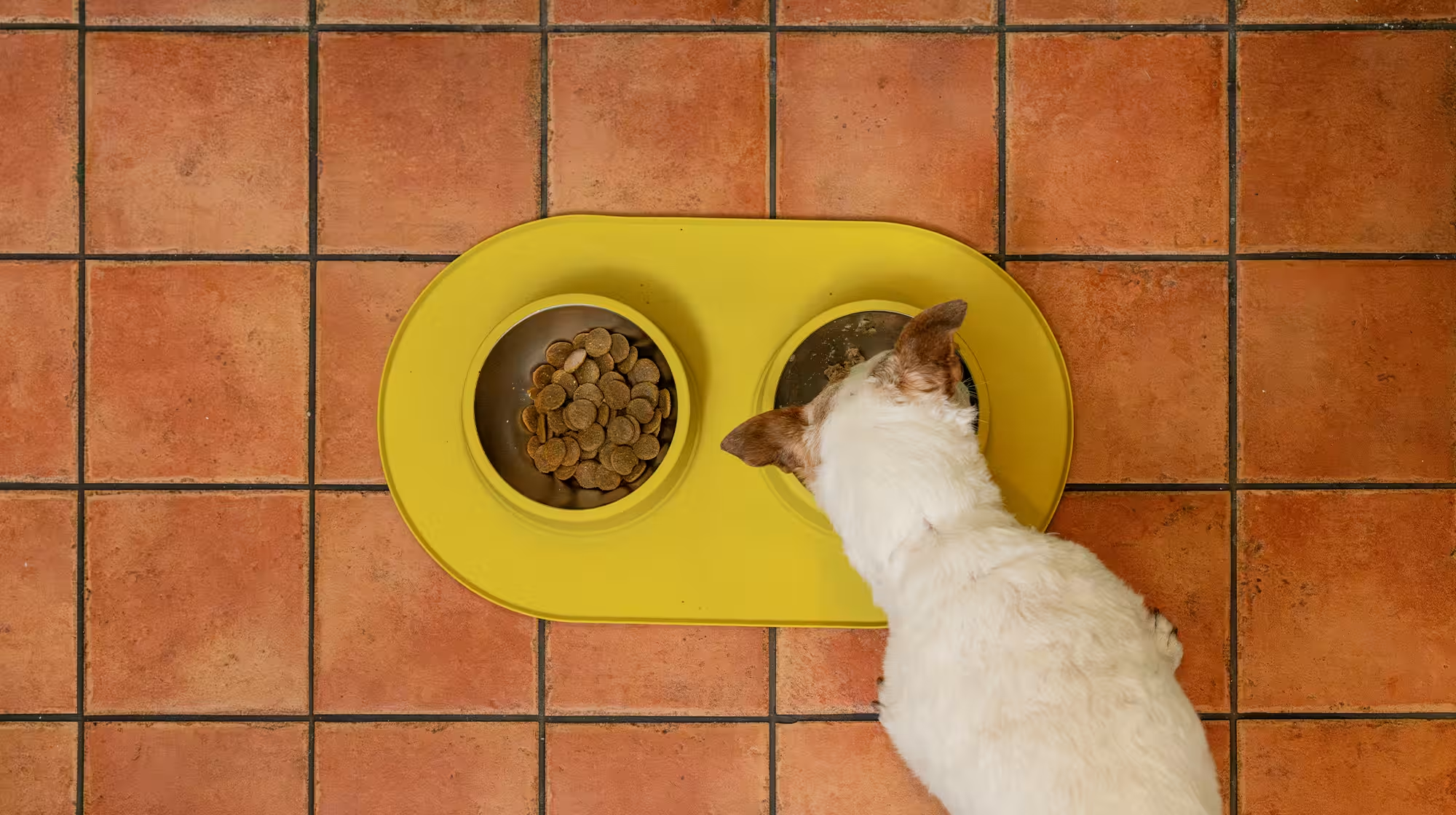Key Takeaways:
- Kidney disease can also be called Renal disease, and it comes in two forms: chronic and acute. It’s relatively common, especially in older dogs .
- Symptoms of kidney disease in dogs include drinking and peeing excessively, peeing in the house when they don’t usually, vomiting and diarrhoea, weight loss and lack of appetite, ulcers and pale gums, general lethargy and dullness, weak bones and joints, and sudden blindness.
- Treating kidney disease in dogs can include switching to a renal diet, medications from your vet like phosphorus binders, blood pressure regulators, or medicines to manage vomiting, nausea and UTIs and fluid therapy.
Kidney disease can be a worrying diagnosis for a dog owner no matter what the severity, and you may have a barrage of questions and concerns. You may wonder what signs to watch out for, what causes kidney disease, how to treat it effectively and whether you should change your dog’s food ? With the right advice, food and veterinary treatment, you should be well equipped to give your dog with kidney disease a calm, happy and comfortable life with as little trouble from their symptoms as possible.
If you’re in the dark over what could indicate kidney disease in your dog, or how to care for them if they develop kidney issues, come along with us as we go through the common causes, symptoms and treatment.
What causes kidney disease in dogs?
Kidney disease can also be called Renal disease, and it comes in two forms: chronic and acute. It’s relatively common, especially in older dogs - however there are lots of potential contributors to a dog’s kidney problems, so the cause isn’t always completely clear.
Some breeds of dog are genetically predisposed to kidney issues, such as English Cocker Spaniels, German Shepherds or Bull Terriers.
Ingesting toxic substances can contribute to kidney failure; things such as antifreeze, rat poison, artificial sweetener or even grapes.
Some may have kidney disease as a side effect of cancer or other illnesses.
Kidney disease can be the result of a severe injury to your dog.
There has been evidence that periodontal disease (a very common condition of the mouth and gums that leads to tooth loss) can lead to kidney and liver damage.
Sometimes, the dog is just suffering from old age, and sadly their organs may start to malfunction or not work in the same way as they used to.

Signs & symptoms of kidney disease in dogs
As all the major organs, the kidneys are extremely important to a dog’s functioning - they filter toxins from the blood, regulate levels of potassium and sodium, conserve water and produce urine.
Therefore, symptoms of kidney disease in dogs often show up as dehydration or urinary issues, or as general sickness.
Look out for the following signs of kidney disease:
Drinking and peeing excessively (as the kidneys lose their ability to conserve water, it comes straight through as urine)
Peeing in the house when they don’t usually
Vomiting and diarrhoea
Weight loss and lack of appetite
Ulcers and pale gums
General lethargy and dullness
Weak bones and joints
Sudden blindness (this can come from high blood pressure)
If your dog is displaying one or more of these signs, book an appointment with the vet immediately so they can do a thorough check of your pooch.
How do you diagnose kidney disease in dogs?
Once you’ve taken your dog to the vet and explained their symptoms, it’s likely they will carry out blood and urine tests. Abnormalities can show up in urine that indicate kidney disease, whereas an elevated blood pressure is also a sign. In some cases, your dog might go for an ultrasound or x-ray to check the size and shape of the kidneys.
If, after testing, it’s confirmed that your pooch has kidney disease, the next step will be to assess what type, and how advanced the disease is.
Acute vs chronic kidney disease in dogs
There are two types of kidney disease in dogs - chronic and acute:
Chronic kidney disease is irreversible, and means the kidneys progressively degrade over time. It’s usually caused by a kidney malfunction rather than consumption of a toxic substance or an illness, and though it means progressive deterioration of the kidneys, symptoms can appear to come on suddenly.
Acute kidney disease is usually sudden onset, and can be caused by either cancer or another illness, an injury, or as a reaction to a toxic substance. Acute kidney disease may be fatal in some cases, or it may be cured completely by treatment. In other cases, it may cause permanent damage that eventually leads to chronic kidney disease.

Stages of kidney disease in dogs
To identify just how poorly your dog is, and make it easier to assess treatment, kidney disease is diagnosed in stages.
Stage 1 (early stage kidney disease in dogs)
Stage 1 indicates the very start of the disease - usually identified by extra protein in the urine, or overly dilute urine. The first stage is hard to detect, as it often shows very few symptoms, if any at all. Dogs are born with so much kidney tissue, that it could be months of damage to that tissue before any symptoms start to show. At this stage, your dog shouldn’t be feeling any discomfort.
Stage 2 kidney disease in dogs
Stage 2 is a very mild stage of kidney disease, in which a dog may be showing slightly more obvious symptoms such as a decreased appetite or weight loss. This is when the kidneys are becoming more damaged than in Stage 1.
Stage 3 kidney disease in dogs
Stage 3 is a moderate stage of kidney damage progression. Your pooch will start to show more severe signs of illness - they might be sick and get diarrhoea, appear to be generally low, go off their food, and pee and drink a lot more than usual. The medications your vet prescribes and the specialist food your dog eats will be even more vital at this stage of the disease.
Stage 4 (end-stage kidney disease in dogs)
Stage 4 is the most serious diagnosis - it generally indicates late to end stage of kidney disease, also known as kidney failure. When given this diagnosis, there usually isn’t a lot of time left, and the treatment will revolve around keeping your lovely dog comfortable, well loved and fed as well as possible for the rest of their time with you.
Treatment for kidney disease in dogs
If your dog is diagnosed with kidney disease, their treatment will depend on the type and stage of their condition. At first, it may be putting them on a renal diet, which will later increase to include treatment for their more severe symptoms.
Generally, treatment could be any or all of the following:
Switching to a renal diet. Malfunctioning kidneys require food that doesn’t put pressure on them, so your pooch will likely be put on a specialist renal diet.


Renal Dry Dog Food
This Renal dog food is a grain free, vet-approved recipe to support kidney disease or those with chronic renal insufficiency. It contains carefully selected ingredients known to be kind to your dog's kidneys.
-
Veterinary dog food
-
Low phosphorous
-
Low protein
Current price: £19.99
Renal Dry Dog Food
You or a vet will need to administer medications such as phosphorus binders, blood pressure regulators, or medicines to manage vomiting, nausea and UTIs.
Fluid therapy. Kidneys affect fluid in the body, so your dog may need intravenous fluids to restore hydration and electrolyte balance, as well as flush toxins through their kidneys.
Supportive measures. This includes adding supplements such as fatty acids to your dog’s diet to boost their health, using appetite stimulants, and taking regular urine and blood tests to monitor progress.

What is a Renal diet for dogs?
We’ve mentioned a renal diet a few times in this article, as it’s a vital treatment for a dog with kidney problems.
A renal diet, or kidney-friendly diet, will alleviate symptoms of kidney disease, protect the kidneys from working overtime and encourage your pooch to eat more, as they’re likely to go off their food as the disease progresses.
Alongside the right medicines and treatment, a specialist, vet-recommended renal food should significantly improve your pooch’s wellbeing and even extend their life expectancy.
It can be nerve-wracking to know exactly what kind of food a dog with kidney disease should eat, and which food groups and snacks to avoid - so read our fuss-free article on the best food for dogs with kidney disease to put your mind at ease.
Pooch & Mutt's Veterinary Renal Food has been thoughtfully formulated in accordance to a renal diet; so contains gentle proteins like Salmon, Peas and Eggs; Chicken fat for a delicious taste to stoke their appetite; and Salmon oil for those essential Omega 3 fatty acids. A lot of renal foods on the market contain grain, making life difficult for pooches with kidney disease and a grain intolerance - so we’ve made sure our renal food is also entirely grain-free.
Our dogs are so precious to us, and we know that having a kidney disease diagnosis is far from a desirable outcome. No matter what their condition, having access to the right food and treatment can take some of the mental load off, so that you can concentrate on loving and caring for your dog every day.
If you’d like to put your dog on a grain-free renal diet for dogs, take a look at our Veterinary Renal Food , one of the specialist recipes in our new Veterinary range .
If you want to learn more about what to feed your dog if they have kidney problems, check out our blog here .












My dog has diabetes and stage 2 kidney do I get food to support the kidneys or diabetic food no one seems to know at the moment I am giving renal food but is it wrong for his diabetes
We would advise speaking to your vet about this, as they know your dogs history and would be best placed to advise which food is best for your pooch. :)
My 16 year old patterdale has been diagnosed with stage 3 kidney disease.She has been hospitalised for IV fluids and now at home with oral medication.She is drinking small amounts but refuses absolutely any food and we can't get her tablets down her.What can we do to help her ?
We would advise speaking to your vet about this, as they know your dogs history and would be best placed to advise what to here. If we can help with anything else, please reach out to the team on pooch@poochandmutt.com
my dog Milo a Morkie 12 years old has Kidney problems his BUN is 63 his CREATININE is 2.8 and SDMA IS 18.3 what can I do to help him Im willing to do anything please help he is my best friend
Hi ,Can I give my dog who is 14 months and been put on a Renal diet (Pooch & Mutt) your Peanut butter dental chews , as I thought peanut butter was bad for them ? Thank you
Hi Julie, Our Peanut butter dental sticks contain a very low protein level and would be a great treat for your pooch. Peanut butter is ok for dogs in moderation, so long as it doesn't contain xylitol; which is dangerous for dogs. :)
Hello, my 2 1/2 yr old boxer dog was diagnosed with kidney disease today. his albumin is 1.2 yesterday & a week ago. It was 1.8. I hear normal is three. The doctor suggested science diet, but I was looking to see if there was something better than science diet. Any suggestions?
Hi Angela, Our Renal Dry Food may be a suitable option for your pooch. It has been designed for renal function support and is suitable for those with stage 3 or 4 Renal Disease. It is a veterinary diet and we would always recommend consulting with your vet for further guidance before feeding. If there is anything else at all we can help with, please reach out to the team on pooch@poochandmutt.com :)